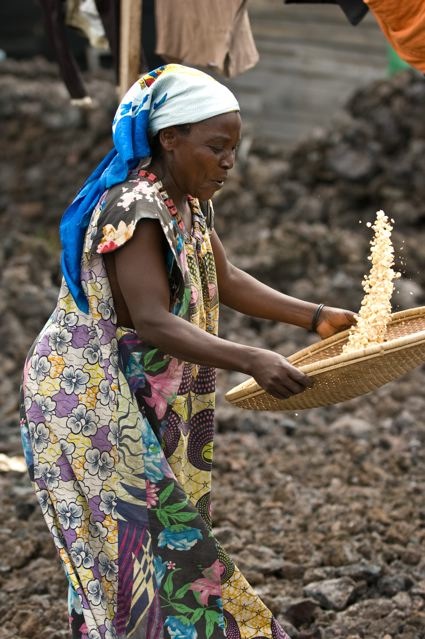
|
|
|
| Home » |
HEAL Africa's Hybrid Approach to Savings, Lending and CreditHEAL Africa began to try approaches to credit and lending in 2000. With the conflict in the area, and the volcanic eruption of 2002 when so many lost everything, HEAL Africa started again with micro-grants, thinking that the women were too poor to pay back credit. At that time there were no micro-finance organizations working in Goma; it was deemed too unsafe. HEAL Africa's programs work with many very vulnerable people who often live on less than a dollar a day. The strategy has evolved over the years by the Congolese staff of HEAL Africa (with input later from microfinance organizations working in the region who worked with people with a little higher standard of living). Because the HEAL Africa staff is connected to the reality on the ground in Goma, in villages in North Kivu and Maniema provinces, they've been able to adapt and adjust the strategies over the years. The ongoing unrest in Congo calls for a different type of financial assistance and HEAL Africa uses financial training, savings collectives, small business training, and community accountability to maximize the impact of the micro-loan. The money stays within the community. It becomes their bank, and everyone knows where the money is and goes. The repayment rates are exceptionally high. In the Maniema program for the first 18 months it was 98% repayment.
HEAL Africa's programs work with the poorest of the poor. All credit and income generation programs are related to a specific target group that HEAL Africa staff have already been working with HIV, Gender-based violence, Safe Motherhood, or community mobilization groups. Many have just returned from living in internally displaced people camps or are in difficult health situations. HEAL Africa focuses on the following target groups: HIV/AIDSHIV has devastated many families in DR Congo. Added to the conflict, which has continued in eastern Congo for the past 17 years, there are many orphans and children living on their own. Many grandparents care for their grandchildren because the parents have died of AIDS. HEAL Africa's policy is to encourage Foster Families rather than orphanages or institutions. In the long term, it is more constructive to help foster families become stronger and keep children within the family structure as much as possible. Over the past six years, more than 1,000 children who were orphaned by AIDS have been kept in school and in a family with a supportive structure. Often when an orphan is taken into a foster family, they do not go to school because it is difficult enough for the family to send their biological children to school; one of the stipulations of the grant is that the family must put money in a savings account every month that will pay for the child's education. In fact, one foster mother has purchased land for her foster child, guaranteeing that he will have his own place when he grows up! This program began with grants, but has developed into a loan program that is kept within the community. When the loan is repaid, the borrower becomes an investor in the group, continuing to put money in monthly. That is rotated around the solidarity group on a monthly basis, raising the level of capital one has for a business. This is a life-changing opportunity for poor women and child-headed households. People living with disabilities and chronic medical problemsAs a hospital specializing in orthopedic surgery, HEAL Africa treats people who have lived with crippling physical disabilities since birth. Many have been marginalized from society without adequate support or care. In addition to medical treatment, HEAL Africa offers vocational training and access to credit for people living with disabilities restoring their dignity and giving them the opportunity to start their own business. Children who come to the hospital for treatment often attend school for the first time. Parents who come to care for their children may also learn new skills to use when they return home. Women of child-bearing age in Safe Motherhood GroupsWomen receive a grant that will be kept in trust in the village by women of child-bearing age to provide funds to help women pay for prenatal and delivery costs. This is through the Safe Motherhood program, which teaches traditional birth attendants, nurses at local clinics and doctors in hospitals who need improved techniques and tools, making better care both accessible and affordable. This program has been highly successful in reducing maternal and child mortality. WidowsWidows are marginalized in many ways in Congo. They are often blamed directly or indirectly for the death of their husband. Their goods, including older (useful) children, can be taken by the husband's family. Widows have been nurtured by others with similar experience. They learn practical skills that renew their self-confidence and help them raise their children. They meet monthly, develop friendship, support each other. One element of success is that each group helps "give birth" to a new group and nurtures it along. By "paying it forward" in this way, they are able to provide an emotional and spiritual support base, as well as providing practical support and encouragement such as helping each other rebuild their houses, or farming together. Literacy, practical business advice, a structure for saving, a trusted support group, and the motivation to help others are key elements of this program. For more information about HEAL Africa's experience with credit and income generation, see Credit and Income Generation at HEAL Africa. |
|
Our Mission Providing holistic care including physical, spiritual and social healing for the people of the Democratic Republic of Congo; training for health professionals; support to strengthen communities; encouragement for women in community leadership roles; and support for education and vocational training. Copyright © 2011 HEAL Africa is a registered 501(c)(3) charity | EIN#20-4104936 All Rights Reserved. |

